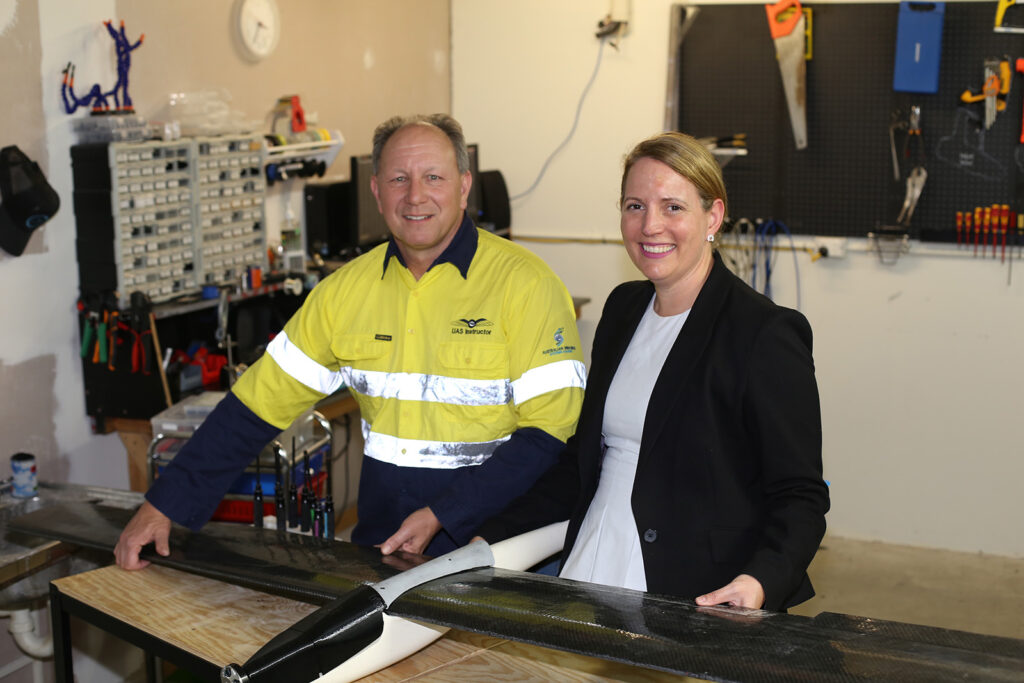The partners aim to leverage the leading innovations of each company in battery technology, aerial drone design and bespoke solar cell integration to build a drone capable of flying in the stratosphere at an altitude of up to 70,000 feet (21 km) for weeks at a time.
The prototype drones will bring together Li-S Energy’s patented lithium sulfur batteries, Halocell’s bespoke perovskite solar cells and V-TOL’s Pegasus fixed-wing aircraft designs to create a family of drones that can undertake a range of long-endurance tasks.

Upon validation, the project partners anticipate far-reaching applications and benefits, with potential commercial applications including:
- Surveillance and security in remote and regional areas
- Environmental monitoring to track conservation efforts and environmental challenges
- Digital farming to support precision agriculture
- Disaster response and relief, including identifying hazards and locating survivors
- Long-range infrastructure inspections to lower costs and improve efficiency
- Delivery and logistics in remote or inaccessible areas
- Research and exploration by geologists and biologists
The product demonstrators are being designed and built to determine the synergistic efficiencies of the combined technologies. Modelling has predicted that the combination of the three technology platforms could deliver a drone with up to six times the flight time of current small-fixed wing drone aircraft.
Li-S Energy lightweight lithium sulfur batteries
The project will utilise battery cells produced at Li-S Energy’s new $10 million production facility at Geelong, which is due to be operational before the end of the year. The increased capacity of the facility will allow Li-S Energy to pursue a range of other collaborations with drone and eAviation companies worldwide.
Li-S Energy Chief Executive Officer Dr Lee Finniear said the partnership with V-TOL and Halocell would provide the opportunity to create an all-Australian drone platform of international significance.
“We are bringing together three innovative Australian companies to build autonomous drones with wide-ranging capabilities,” he said. “This allows us to not only demonstrate the benefits of Li-S Energy cells in practical high-altitude aircraft, but potentially build a new sovereign capability for the Australian aviation industry.”
“Our lithium sulfur battery technology is ideally suited to this type of aerospace innovation, and we see a real opportunity to power the electric aviation revolution.”
Recent testing1 shows Li-S Energy’s GEN3 cells can demonstrate a gravimetric energy density of over 400 Wh/kg and a volumetric energy density of 540 Wh/l. Compared to current Li-ion cells, this is nearly double the gravimetric energy density and a comparable volumetric energy density.
In practical terms, these cells are now the same physical size as existing Li-ion batteries but half the weight.
V-TOL Aerospace Advanced Drone Development
V-TOL Aerospace Managing Director Mark Xavier said he expects, based on initial modelling & testing by V-TOL engineers, that the collaboration would ultimately result in a family of hi-tech drones, sensors and robots capable of operating from ‘dawn til dusk’ and beyond.
“All three partners are at the cutting edge of their respective technologies, and the combination of all three offers some exciting opportunities to test the limits of what is currently possible,” he said.
“A big potential winner of this collaboration will be the Australian economy that has the opportunity to benefit from both the sovereign manufacturing capability of the collaborating partners and the geospatial and communication benefits that a networked drone constellation could deliver.”
“The V-TOL launch product, Pegasus I, will offer a small fixed-wing long-range platform to conduct hi-resolution surveys of linear infrastructure and broad acre farming. The larger Pegasus II aircraft will be developed to provide a low-cost high altitude multi-purpose capability.”
Halocell Perovskite Solar Cell Technology
The third partner in the collaboration, Wagga-based Halocell, is focused on commercialising Perovskite Solar Cells (PSC), a leading next-generation solar solution for the global energy transition.
Halocell’s bespoke solar cells are custom designed to maximise energy harvesting efficiency. The integration of these cells into the drone’s structure will allow the drone to harness solar energy during day flight, supplementing the battery and significantly extending the aircraft’s range.
Halocell’s CEO, Paul Moonie said the company was pleased to be part of the collaboration and to demonstrate the application of their solar PV technology in drones.
“We believe adding our cells to drones will add an entirely new dimension to flight time and efficiency,” he said. “Aerospace and aviation are key areas of focus for us moving forward, and this opportunity to partner with Li-S Energy and V-TOL is an important step for us.”



